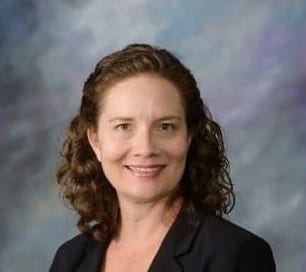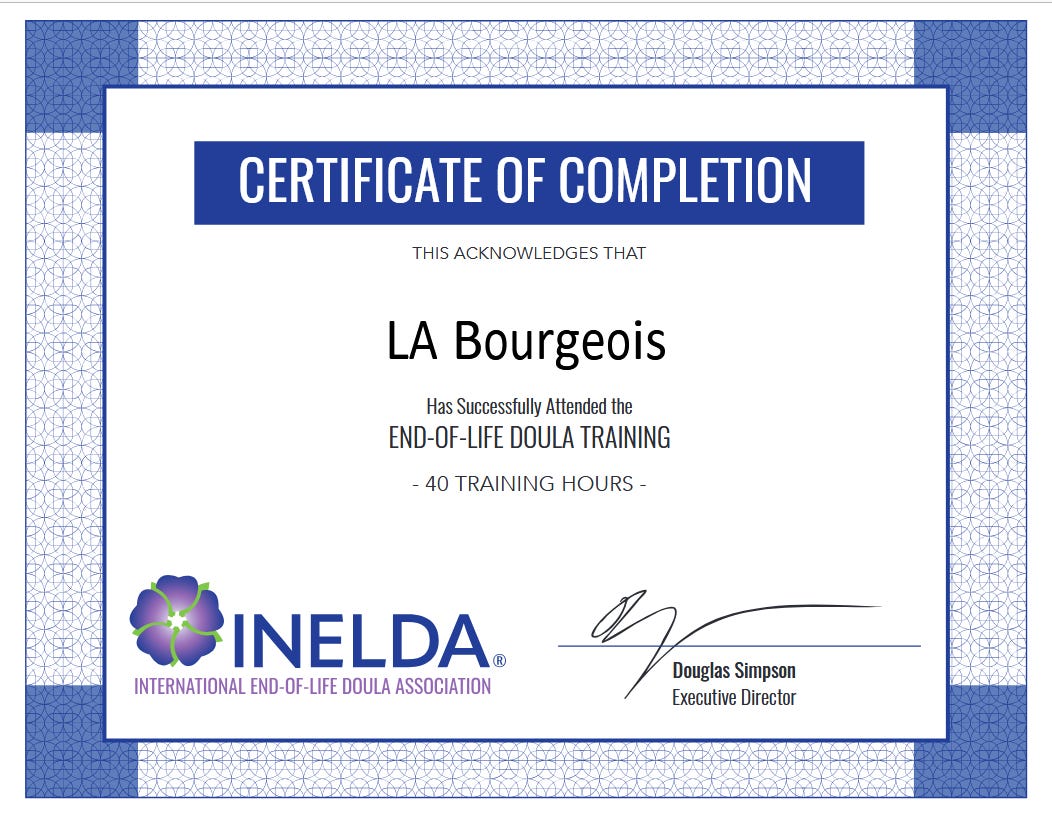It's Not Over When It's Over
A Funeral Director Explains How to Keep Your Remains in the Right Hands
As your favorite lesbian auntie, one of my goals is to fill your brain with good information about what it means to age, deal with inevitable illness and injury, and die as a member of a population that experiences a higher than usual percentage of estrangement from their biological family as well as the establishment of found family. Now, you don’t have to be queer to experience this sort of rejection, so all you straight folks who know this pain should read closely too.
Recently, I decided to train to become an end-of-life doula. This felt as natural to me as becoming a writer, a creativity coach, and a lesbian. When I heard the term for the first time, a zinging recognition flowed through my body. And even though I haven’t been involved in hospice work for more than a decade, I couldn’t pass up the opportunity to complete the training and find a new way to engage in the work of supporting people through their final transition.
Back when I was training to be a hospice volunteer in the 2000’s, the organization shared a very sad story of a lesbian couple. The family of the dying woman, who at this point was unable to advocate for herself, blocked her partner from being in the room with her. They completely rejected her lover and deliberately excluded her from the experience, even though they hadn’t been a part of the dying woman’s life for years. And the hospice organization had to abide by their wishes because they were the next-of-kin, no matter that the woman had a partner and group of local lesbian friends who probably knew her better than any of them.
My heart broke. How could I prevent this sort of thing from happening in the future? And then I remembered the medical or healthcare power of attorney. This document designates someone to affirm your medical wishes when you are unable to do that yourself. Giving your partner or trusted friend medical power of attorney can prevent an estranged parent or other family member from entering the situation and trampling over or excluding your partner and friends from not only the decision-making process but maybe even the room where you are potentially dying.
Bingo! This is the answer, I thought, and stopped my questioning. I made sure that my wife and I both had this important document in place and went about my life.
Until this end-of-life doula class where I asked if anyone had experienced this sort of horror show during their doula work. I mentioned the medical power of attorney, and a funeral director spoke up, “The medical POA ends when the person dies. To ensure that your most important person still has charge of your remains after death, you need to make them the authorizing agent.”
What the what? What is this? I needed to know more! So, I asked if she would be willing to share. Thus, we all get to hear from Hilary Shepherd, a funeral director and death doula from Ohio, about the importance of pre-planning for death and how to make sure that the people that we’d prefer dealing with our remains actually get a chance to do that.
As a funeral director and death doula, how you would counsel someone who is in the LGBTQIA2s+ community, especially if they don't have particular support from their family because they are estranged or maybe not even out of the closet?
Legally, we have certain people that we are blood related to, that are our next of kin. In the eyes of the death care system, that doesn't matter if you have the appropriate paperwork and things in place. I learned about this because I do not have a relationship with my biological father on purpose, and it dawned on me that if my mother died and then I died, he would be my next of kin, which means he would have the rights over the disposition of my remains. F— that, right?!
So I looked into how to make that not possible, and that's when I learned about the authorizing agent. I made my sister my authorizing agent, and that means, if our mom dies, and then I die, my sister's in charge, and that guy is just a nothing. I filed it. It's been recorded, it's been notarized, and it really is so simple. It's just a matter of paperwork, getting a funeral home and making a file with them. Then you give the insurance company all the paperwork saying that this person is in charge of your disposition.
The one thing that I would caution people to really think about is a Power Of Attorney (POA). If you make your partner a POA, that power of attorney ends at death. People come in and they're like, “Oh, I'm his POA.” And I'm like, “Okay. Well, he has a daughter, and she's technically in charge because POA ends at death.” I don't think a lot of people understand that also putting something in your will is pointless because a will doesn't come into effect until probate, and that comes months after disposition (which is the term for disposing of the body, most often burial or cremation). Medical or healthcare POA is not durable (meaning not extending past death).
I have healthcare power of attorney for my wife.
So you can make medical decisions, but what happens if she passes away? Are you then able to make decisions for her disposition?
Number one, we are legally married. And our families respect that and each other. Definitely everyone would allow me to make the decisions.
You say that now, but people get crazy. Grief does weird things. It's way better to have more paperwork than you need than not having that one piece of paper you should have fucking done. I sent you a link that has some state by state information, and you can get those forms from funeral homes. But even if it’s just something informal… I was a notary when I lived in California, and anything can be notarized, even a napkin, as long as it's got the two parties in the stamp, right? So even if you don't have an official form, if there's just a letter that says I want this person to be in charge of me when I die, that can work. You take it in and both sign it when you get it notarized. But I recommend that you do that in conjunction with some sort of pre-planning with a funeral home, because you don't want to be the only ones with the paper. There needs to be someone, and you don't necessarily have to pay for it, but at least having something in a file in a place that you can go to is highly recommended. At the funeral home, we have notes from people and we have to respect their wishes.
So you can file one of these authorizing agent forms with a local funeral home without going through a pre-planning process.
Everybody is different, but usually you could do something like that, correct. And if you're going to do that, then you're going to want to let your loved ones know what that funeral home is. There’s a booklet called “Guidelines for Putting My House in Order” that you can get from any funeral home. A website I go to a lot is called Funeral Basics, and they have a lot of articles on there, a little booklet, and a little pre-planning thing-a-ma-boo where you can put all that stuff down. It’s important to have way more documentation than you need. It's just better to be protected and not need it, then not have it and need it.
Have you ever dealt with dealt with this sort of situation before?
It was two gentlemen, and they had been together 50 years, but never legal, just common law. They lived here (in Ohio) and the mom lived out of state, and she wanted to come in and do all the planning. His partner had his POA, which technically ended at death. But then there were other indications through conversations with his partner and his mother that he and his mother were actually estranged, and because she was out of state and didn't even want to come in for a service, she wanted immediate cremation. And his partner was like, “No, we had this whole thing planned out. We're going to have a garden ceremony.” I was able to convince the mother to give up her rights to disposition (which is another form). But that's not always successful. It was in this case, but in my experience, some parents that have rejected their queer children all of a sudden have this guilt at death. So they want to swoop in and take over and give this person all this love that they didn't have when the person was alive. It's a matter of convincing those family members that they really don't have the right to make these decisions. But if they're steadfast, then you have to get them and the partner to figure something out. And I've had a couple moments, not with queer families, where I have had to send people out to the parking lot and be like, “Y'all need to figure this out.”
What is the one thing that you want people to walk away from this piece knowing?
I think my biggest piece of advice is to make your wishes known and put them somewhere solid. Have someone you trust have a copy of it. Have your partner have a copy of it. Put something in a safe deposit box and give someone access to that, because when it's in your own hand and in your own word, ethically, funeral directors can't disagree with you. If the person who has passed had all this stuff in writing, then there's none of this, “well, he wanted this,” and “she wanted that.” It's right there. Put it in writing.
Thank you, Hilary!
Want to support more info gathering interviews like this? Here’s a list of ways:
Leave a comment or Share this piece with your friends (FREE!)
Grab a copy of my first book, Diary of a Lesbian Housewyfe ($9.99)
Or get a paperback copy at Bookshop.org (or order from your favorite indie bookshop)!
Purchase a book linked from this post at Bookshop.org. I’m an affiliate and so will get a little spiff. As will your favorite indie bookshop! It’s a win-win-win!
Sign Up for a Paid Subscription and get an extra essay a month, a copy of my new ebook, Lesbian Housewyfe: Bigger, Broader & More Delightful, and all sorts of new fun things as I come up with them! ($5/month or $50/year)





